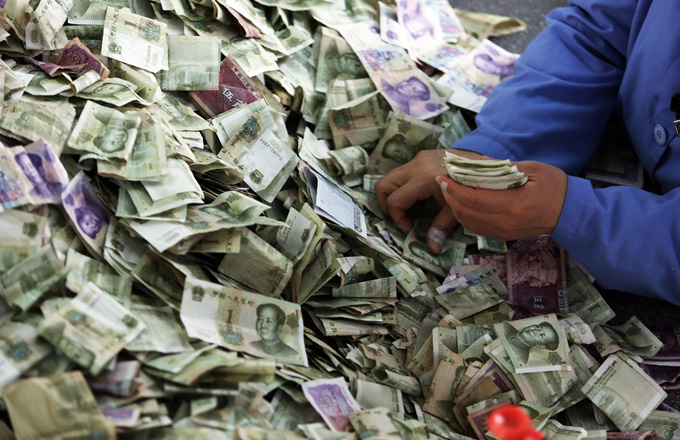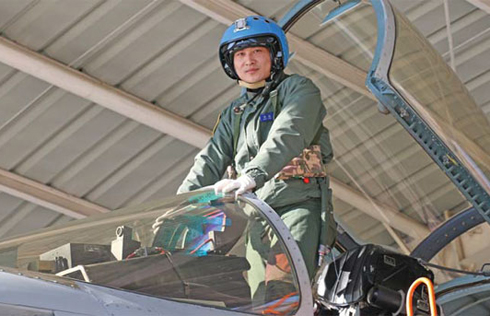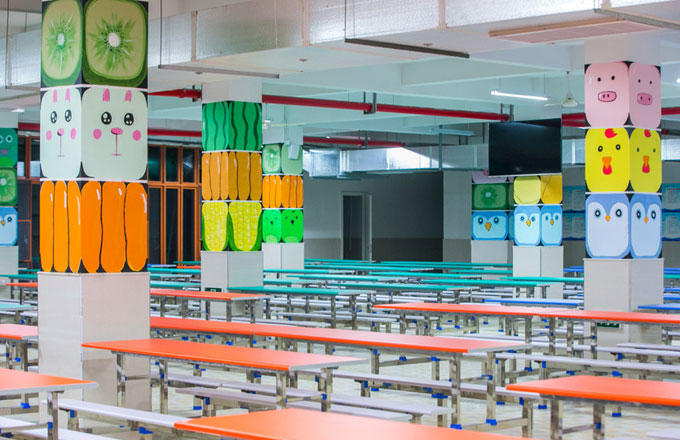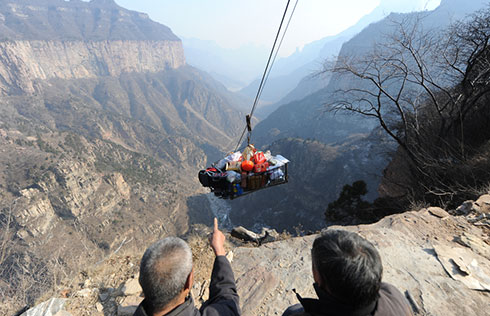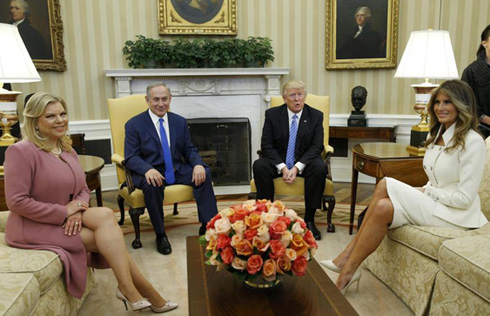

|
The busy expressways of Chengdu, capital of Sichuan province. The city has become a hub for many global financial service companies and manufacturing giants. Provided to China Daily |
City has become one of the country's centers of international investment
On a nighttime satellite map taken by Google Inc that went viral in China recently, the country's most illuminated parts - a clear sign of economic prosperity - are concentrated in the coastal areas of the Yangtze and Pearl river deltas.
But in China's vast western region, there's another area standing out brightly from the surrounding darkness: the growing Chengdu metropolitan area, which is becoming one of the country's shining examples of economic growth.
Officials at the city's bustling Shuangliu International Airport - the fourth-busiest in China in terms of passenger numbers after Beijing, Guangzhou and Shanghai - are already contemplating the addition of more terminals, shops and runways to cater for ever-growing traffic, even as the paint dries on a new terminal.
Scores of taxis and buses are on hand to whisk arriving passengers to the city center, and along the busy expressway you cannot fail to notice the showrooms selling top automobile brands, and shopping malls full of customers.
Several of the city's glitzy five-star hotels, set up by major chains such as Kempinski and Intercontinental, are now looking to expand further to cater for their growing number of international guests.
The capital of Sichuan province has become a hub for many global financial services firms and manufacturing giants, propelling the previously lesser-known city into one of the country's fastest-growing foreign direct investment locations.
The Tianfu New Area is Chengdu's new focus, which will become an international livable area with modern manufacturing industrial clusters and high-end services. It will become a model area that combines modern industries and modern lifestyle in regional development.
Chengdu was the only interior Chinese city that appeared in the 2011 and 2012 annual Top 10 Best Foreign Investment Strategy Cities in Asia and the Pacific Region published by FDI, the news and foreign direct investment publication owned by The Financial Times.
And in June, it will become the first western Chinese city to host the prestigious Global Fortune Forum, after Shanghai (1999), Hong Kong (2001) and Beijing (2005).
Announcing the city as its choice for the event - which is expected to attract numerous Fortune 500 companies and their top brass, along with government and industry leaders - Andy Serwer, Fortune magazine's managing editor, said: "At a time when China is in the forefront of global business, Chengdu is the ideal location for the next Global Forum."
Situated in the heart of China's rapidly growing western region, Chengdu has become a dynamic magnet for multinational companies, a center for higher education, and a leader in diverse range of industries from automotive and logistics to technology and services, he said.
The organizers have suggested that its success can be best summed up in just three words: "China's New Future".
The cumulative direct investment made by 233 Fortune 500 companies in Chengdu during 2012 was $8.59 billion, a 31 percent growth year-on-year
In 2007, when Bai Fan first arrived in Chengdu on a cold night at Shuangliu airport, things were not as hunky-dory as they are today.
Now the general manager of the Chengdu operations of Symantec Corp - the American global computer security software company, and a Fortune 500 company - he had arrived to research a possible operation in the city.
Fan found himself staring at deserted parking lots with no taxi or bus in sight. There were no foreign faces around, nor were there any signs of expatriate communities.
He says no one at the company's headquarters in California had ever heard of Chengdu, but over the next five years, he and his team worked hard to make Symantec an integral part of the Chengdu High-tech Industrial Development Zone. It has also set up a Security Response Center in Chengdu to support its other centers in Tokyo, Dublin and Culver City in western Los Angeles County, California.
"When you compare these past five years with the 30 years that it took for Symantec to evolve as a global company, it does not seem like a long time," said Bai.
"But we have made tremendous progress in China during these years, with Chengdu becoming the vital cog in that journey."
Surrounding Symantec at the Tianfu Software Park are other multinational corporations such as IBM, Cisco and Dell.
Though wary at first, much as he was, many have decided to set up shop in Chengdu after being convinced by the city's "can do" attitude, he says.
Diverse industries
Its success can be measured by the vast array of high-tech industries based in the city, he adds, with companies from such sectors a IT, new energy, new materials, bio-pharmaceuticals, aviation and aerospace, automobiles, and petrochemicals.
With its target on attracting more foreign investment, the Chengdu government has invited some of the world's leading enterprises to settle in city.
Take automobile industry for example. There are 139 automobile enterprises in Chengdu, including Volvo, FAW Volkswagen and FAW Toyota.
At the Chengdu Economic and Technological Development Zone, more than 50,000 workers are involved in various activities related to the auto industry, from trade, exhibitions, research and development, to the manufacture of spare parts and whole vehicles.
In 2011, the total output value of automobile enterprises in Chengdu reached around 50 billion yuan ($8 billion).
By 2015, that figure is expected to reach 275 billion yuan, with an annual production capacity of 1.5 million vehicles.
Chen Xiaoming, deputy director of the Automobile Investment Service Bureau at the development zone, said low logistics costs and easy access to other parts of China, coupled with the fast access to Europe and Southeast Asia, have proved irresistible for many global auto companies. "In addition, the presence of key players like China FAW Group, Volkswagen, Toyota and Geely, has brought many auto-related business and industries to the area," he said.
Over the past 12 years, Chengdu has been at the forefront of western development in China, and its average annual economic growth rate is amongst the highest of the 12 provincial capital cities in central and western areas.
As a trade and logistics center and transportation and communications hub, Chengdu also boasts the most developed aviation and railway networks in those regions.
Many executives from international companies also say the city's talent pool has been a major attraction.
"We chose Chengdu for the cultural environment, forward-looking government and excellent labor resources, not for its labor costs," said Bian Chenggang, general manager of Intel Products (Chengdu) Co Ltd.
Chengdu mayor Ge Honglin says he has often been asked what hosting the Fortune Global Forum means for the city.
He compares the upcoming event to the 1999 Forum, held in Shanghai's Pudong New Area, which he attended, adding that it played a key role in raising the international profile of what was then a newly developed economic area.
"It's a great opportunity for the world to better understand Chengdu and for Chengdu to go international," Ge said.
Xu Fengxian, a senior researcher with the Institute of Economics at the Chinese Academy of Social Science, said that Fortune's choice of Chengdu illustrates how China's economic development is moving to the west of the country, and how the region is being opened up to the world.
Wang Zhile, a researcher at the Chinese Academy of International Trade and Economic Cooperation, added that Chengdu's development is a clear example of the country's efforts to "go global".
Contact the writers at zhaoyanrong@chinadaily.com.cn and zhengyangpeng@chinadaily.com.cn
(China Daily 03/29/2013 page15)
